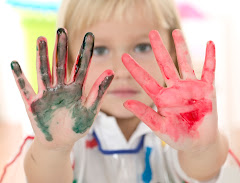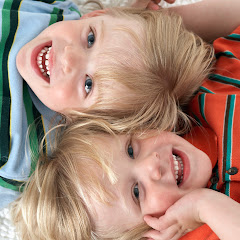
Wednesday, May 20, 2009
Don't Forget to Sing
If you are at a loss for songs to sing, there are many good books at the library. The children in my class enjoyed the book and song, "There Once was a Man Named Micheal Finnegan" by Mary Ann Hoberman this year. They also enjoyed Miss Mary Mack by the same author. There are many other books based on a songs such as "On Top of Spaghetti" by Paul Brett Johnson, "The Lady with the Alligator Purse" by Nadine Bernard Westcot, "Five Little Ducks" by Raffi, and "The Wheels on the Bus" by Annie Kubler.
Here are a few song titles you might have forgotten about:
Cat Goes Fiddle-i-fee
The Ants Go Marching
Bingo
Baby Bumble Bee
This Old Man
The Little Skunk's Hole
S-M-I-L-E
Ten in Bed
Bear Went Over the Mountain
It's Raining, It's Pouring
The More We Get Together
She'll Be Coming Round the Mountain
Skidamarink
I'm a Little Teapot
If you need lyrics, try:
www.kiddles.com/lyrics/index/html or http://bussongs.com/
Sunday, May 17, 2009
"Ruby in Her Own Time" and "D.W. The Big Boss"
Spring is the perfect time to read this story. Children are outside playing with others. Some of them are learning to hit a ball, ride a bike. and others will soon be learning to swim. Not everyone will be good at these things and Ruby in Her Own Time will help 4 and 5 year be a little more accepting of themselves as they work to learn a new skill.
In the classroom, children can discuss the things they want to learn to do. Some of the older students may be able to share stories of how they learned those same skills. Children need to hear that it takes practice to master a skill and that others had trouble learning too. Knowing that your best friend fell off her bike before learning to ride may be just what is needed to give you the confidence to keep trying.
On the other hand, if you know a child who is just a tad over confident and likes to tell others how things should be done, you might want to read, D.W. The Big Boss by Marc Brown. Family members don't like having D.W. boss them around and D.W. soon learns that bossing them does not work in her favor. It is often a fine line between being helpful and being bossy and children don't always realize the difference. Come up with a few scenarios for the children to act out. Let them decide if the person is bossy or helpful. While they may not be able to agree on one right answer, it might just get them thinking.
Saturday, May 16, 2009
Big Book of Fears
After my first reading, I knew the illustrations were brilliant, but I wondered if it would really help children deal with their fears. After all fear is a strong emotion which often doesn't respond to logic. While it is hard to find one book that meets the needs of all children, there is a segment of children who want to know how things work and will be please to find out that there is a scientific name for their fears, including the fear of monsters. It will give them a sense of control to be able to identify their feelings and write down their fears as the mouse did. As children record their fears and some possible solutions, they can reflect on the fears and better understand them. I've often heard that gifted children sometimes have more worries, because they have a deeper understanding of things to worry about. This is a perfect book for those children.
Even if you don't have a fearful child in your life, read this book anyway. Enjoy it as a beautiful work of creativity.
Sunday, May 10, 2009
Spring Fever
By spring, my class is ready for me to use the kind of humor in the book, Piggy Monday by Suzanne Bloom. In this story, the children go “hog wild” and forget all the lessons about manners that they learned earlier in the year and they turn into pigs! The Pig Lady comes and reminds the class of the things they need to do and the children all return to their former, well behaved selves. The most critical folks might be insulted that the whole class and teacher becomes swine, but children love the humor and are able to extract the message that goes with it.
A few other tips:
Maintain consistency by sticking to your routine as much as possible and by following through on your expectations.
Add more movement into the day. When Mrs. Shank counted with her class, they stood up on every tenth number.
Encourage parents to help children get more sleep. Remind them of the research about the connection between lack of sleep and behavior problems.
Remember that allergies and their medications may influence attention. Use your best attention grabbing activities. Have the children work on projects that reflect their interests. Provide novel activities. Find out what motivates your children and provide that as a goal or reward. Work more in small groups.
Group work also gives more children opportunities to talk, just be sure to give them clear guidelines and responsibilities. Learning is a social activity so put that aspect to good use.
Have children write and draw about the things they want to tell others. After they do this, give them an opportunity to share their work with others. They get to think about what is on their mind and share it. You get to have them working on fine motor, literacy, and language skills.
Take time to slow down. I know, I feel the end of year push to do all the things we didn't get done and to teach the untaught lessons, so the children must feel it too. Slow down the pace as you and the children take time to appreciate the moment.
Saturday, May 2, 2009
Last Day of School
- Create a calendar or some other way to count down the days of school. You might make a chain with 30 links, and remove a link each day.
- Take time to help children review what they have done over the year and how they have grown. Help them see that they are ready to move on. Get out the photos from the first day and help children see how they have grown. If possible help them make a scrap book/photo album of the year.
- Ask parents to help by discussing with their children what will happen when school is over.
- Provide an opportunity for parents to exchange phone numbers or plan a summer play date or get together for the children.
- Teachers and other adults should let the children know what they will be doing when the children are not in school.
- Let the children help prepare the room for the end of the year. They can help take down artwork, gather belongings, and wipe off shelves.
- Have the children make a book for the next group of children.
- Visit the kindergarten where your children will be attending, if possible or ask someone from the school to visit. If neither of these is possible, take photos of the school, so children have some sort of idea of what to expect.
- Take time to talk about the changes and ask the children what they want to know about kindergarten or the coming changes. Do this more than once as the first discussion may spark more concerns.
- Try to maintain normalcy in the classroom routine right up to the last day. Do not pack up too much too early. Some children will be upset to see things in the room disappear.
- Make sure the last days are positive, so that the children leave school with a good feeling. That feeling may be the one thing they remember most about school.
- Give the children things to do in the days after school is over. Our children have sign in books. I will give these to the children and encourage them to continue signing in each day at home. Giving them a book will encourage reading. Having the local librarian get children excited about the library's summer reading program will give children something for which to look forward. This is especially true, if your class has developed a good relationship with the local children's librarian.
- Read books about the last day of school or saying goodbye. I have read Goodnight Moon to the children and had the children say goodbye to the things in the room. Here are a few other books to try:
When It's the Last Day of School by Maribeth Boelts
No More Pencils, No More Books, No More Teacher's Dirty Looks! by Diane Degroat
Barker Twins: Last Day of School by Tomie de Paola, Ann Marie Harris
Miss Malarkey Doesn't Live in Room 10 by Judy Finchler
Kindergarten Rocks! by Katie Davis

